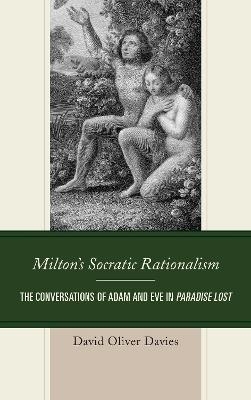
Milton's Socratic Rationalism
The Conversations of Adam and Eve in Paradise Lost
Seiten
2020
Lexington Books (Verlag)
978-1-4985-3264-8 (ISBN)
Lexington Books (Verlag)
978-1-4985-3264-8 (ISBN)
Milton's Socratic Rationalism focuses on the influence of Milton's years of private study of classical authors, chiefly Plato, Xenophon and Aristotle, on Paradise Lost. It examines the conversations of Adam and Eve as a mode of discourse closely aligned to practices of Socrates in the dialogues of Plato and eponymous discourses of Xenophon.
The conversation of Adam and Eve in Paradise Lost, that most obvious of Milton's additions to the Biblical narrative, enacts the pair's inquiry into and discovery of the gift of their rational nature in a mode of discourse closely aligned to practices of Socrates in the dialogues of Plato and eponymous discourses of Xenophon. Adam and Eve both begin their life "much wondering where/ And what I was, whence thither brought and how.” Their conjoint discoveries of each other's and their own nature in this talk Milton arranges for a in dialectical counterpoise to his persona's expressed task "to justify the ways of God to men." Like Xenophon's Socrates in the Memorabilia, Milton's persona indites those "ways of God" in terms most agreeable to his audience of "men"––notions Aristotle calls "generally accepted opinions." Thus for Milton's "fit audience" Paradise Lost will present two ways––that address congenial to men per se, and a fit discourse attuned to their very own rational faculties––to understand "the ways of God to men." The interrogation of each way by its counterpart among the distinct audiences is the "great Argument" of the poem.
The conversation of Adam and Eve in Paradise Lost, that most obvious of Milton's additions to the Biblical narrative, enacts the pair's inquiry into and discovery of the gift of their rational nature in a mode of discourse closely aligned to practices of Socrates in the dialogues of Plato and eponymous discourses of Xenophon. Adam and Eve both begin their life "much wondering where/ And what I was, whence thither brought and how.” Their conjoint discoveries of each other's and their own nature in this talk Milton arranges for a in dialectical counterpoise to his persona's expressed task "to justify the ways of God to men." Like Xenophon's Socrates in the Memorabilia, Milton's persona indites those "ways of God" in terms most agreeable to his audience of "men"––notions Aristotle calls "generally accepted opinions." Thus for Milton's "fit audience" Paradise Lost will present two ways––that address congenial to men per se, and a fit discourse attuned to their very own rational faculties––to understand "the ways of God to men." The interrogation of each way by its counterpart among the distinct audiences is the "great Argument" of the poem.
David Oliver Davies is associate professor of English and classics at the University of Dallas and director of the Ph.D. program in literature at the Institute of Philosophic Studies.
Chapter ONE: Preliminaries
Chapter TWO: Prologue
Chapter THREE: Eve's First Words
Chapter FOUR: An Interlude
Chapter FIVE: Becoming Dear
Chapter SIX: "No more of talk" (9.1)
| Erscheinungsdatum | 10.05.2021 |
|---|---|
| Reihe/Serie | Politics, Literature, & Film |
| Verlagsort | Lanham, MD |
| Sprache | englisch |
| Maße | 154 x 224 mm |
| Gewicht | 304 g |
| Themenwelt | Geisteswissenschaften ► Philosophie ► Philosophie Altertum / Antike |
| Geisteswissenschaften ► Sprach- / Literaturwissenschaft ► Anglistik / Amerikanistik | |
| Geisteswissenschaften ► Sprach- / Literaturwissenschaft ► Literaturwissenschaft | |
| Sozialwissenschaften ► Politik / Verwaltung ► Politische Theorie | |
| ISBN-10 | 1-4985-3264-0 / 1498532640 |
| ISBN-13 | 978-1-4985-3264-8 / 9781498532648 |
| Zustand | Neuware |
| Haben Sie eine Frage zum Produkt? |
Mehr entdecken
aus dem Bereich
aus dem Bereich
mit Sokrates, Seneca, Platon & Co. im Gespräch
Buch | Hardcover (2023)
FinanzBuch Verlag
CHF 25,20


